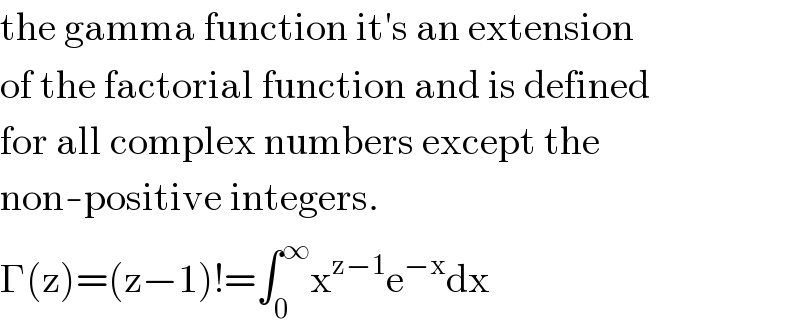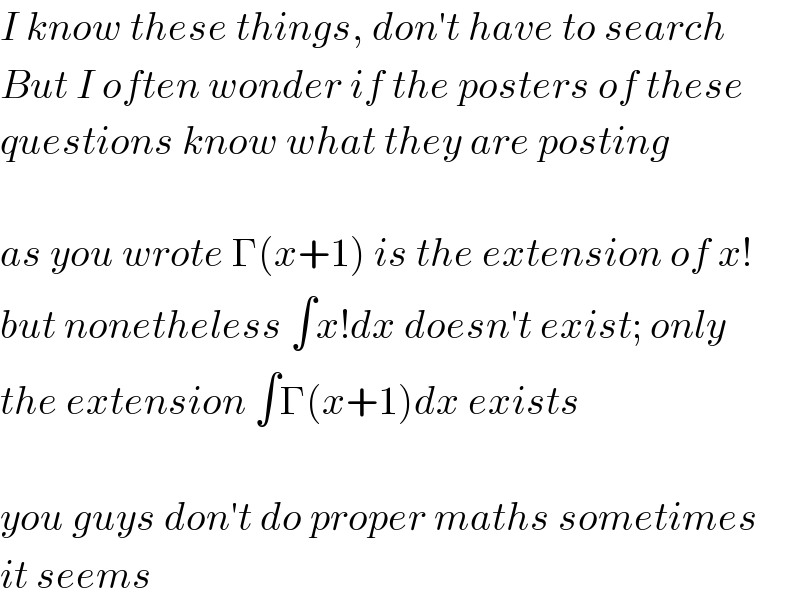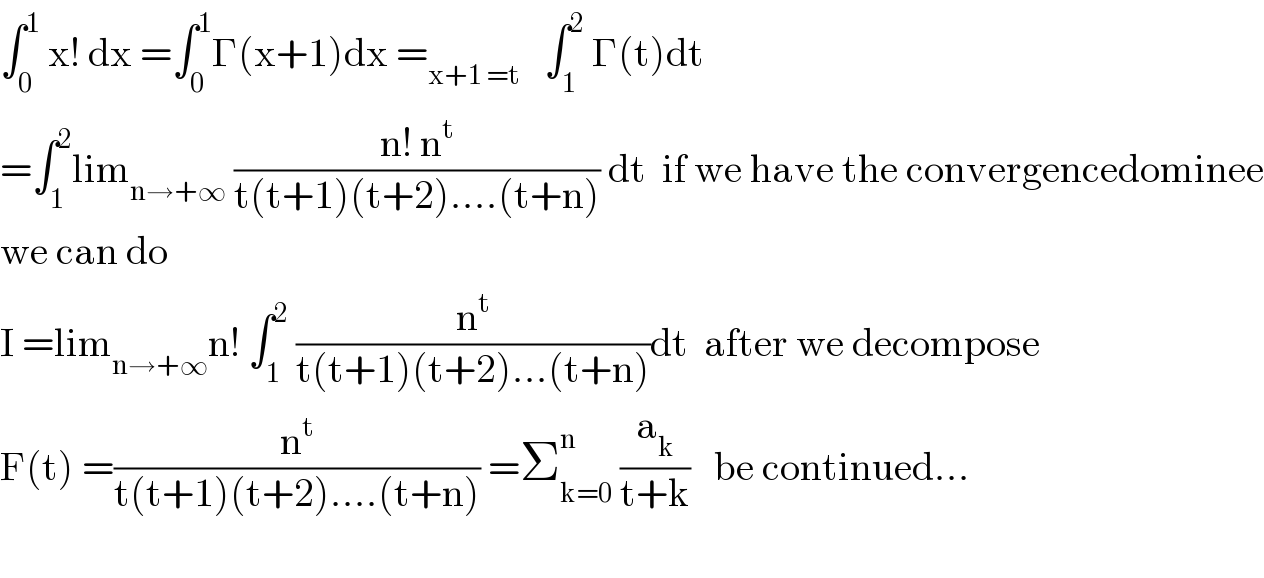Question Number 106745 by qwertyu last updated on 06/Aug/20

Commented by Her_Majesty last updated on 06/Aug/20

$${always}\:{the}\:{same}\:{questions}… \\ $$$${how}\:{do}\:{you}\:{define}\:“{x}!''? \\ $$
Commented by qwertyu last updated on 06/Aug/20

$$\int_{\mathrm{0}} ^{\:\:\mathrm{1}} \:\boldsymbol{{x}}!\:=\:? \\ $$
Commented by Her_Majesty last updated on 06/Aug/20

$${again},\:{how}\:{do}\:{you}\:{define}\:{x}! \\ $$$${x}!=\mathrm{1}×\mathrm{2}×\mathrm{3}×…×\left({x}−\mathrm{1}\right)×{x}\:{for}\:{x}\geqslant\mathrm{1}\:{with} \\ $$$$\mathrm{0}!:=\mathrm{1} \\ $$$${then}\:{no}\:{integral}\:{exists} \\ $$
Commented by floor(10²Eta[1]) last updated on 06/Aug/20

$$\mathrm{you}\:\mathrm{should}\:\mathrm{search}\:\mathrm{more}\:\mathrm{before}\:\mathrm{assuming} \\ $$$$\mathrm{things}\:\mathrm{like}\:\mathrm{that}! \\ $$
Commented by floor(10²Eta[1]) last updated on 06/Aug/20

$$\mathrm{the}\:\mathrm{gamma}\:\mathrm{function}\:\mathrm{it}'\mathrm{s}\:\mathrm{an}\:\mathrm{extension} \\ $$$$\mathrm{of}\:\mathrm{the}\:\mathrm{factorial}\:\mathrm{function}\:\mathrm{and}\:\mathrm{is}\:\mathrm{defined} \\ $$$$\mathrm{for}\:\mathrm{all}\:\mathrm{complex}\:\mathrm{numbers}\:\mathrm{except}\:\mathrm{the}\: \\ $$$$\mathrm{non}-\mathrm{positive}\:\mathrm{integers}. \\ $$$$\Gamma\left(\mathrm{z}\right)=\left(\mathrm{z}−\mathrm{1}\right)!=\int_{\mathrm{0}} ^{\infty} \mathrm{x}^{\mathrm{z}−\mathrm{1}} \mathrm{e}^{−\mathrm{x}} \mathrm{dx} \\ $$
Commented by Her_Majesty last updated on 06/Aug/20

$${I}\:{know}\:{these}\:{things},\:{don}'{t}\:{have}\:{to}\:{search} \\ $$$${But}\:{I}\:{often}\:{wonder}\:{if}\:{the}\:{posters}\:{of}\:{these} \\ $$$${questions}\:{know}\:{what}\:{they}\:{are}\:{posting} \\ $$$$ \\ $$$${as}\:{you}\:{wrote}\:\Gamma\left({x}+\mathrm{1}\right)\:{is}\:{the}\:{extension}\:{of}\:{x}! \\ $$$${but}\:{nonetheless}\:\int{x}!{dx}\:{doesn}'{t}\:{exist};\:{only} \\ $$$${the}\:{extension}\:\int\Gamma\left({x}+\mathrm{1}\right){dx}\:{exists} \\ $$$$ \\ $$$${you}\:{guys}\:{don}'{t}\:{do}\:{proper}\:{maths}\:{sometimes} \\ $$$${it}\:{seems} \\ $$
Commented by Sarah85 last updated on 07/Aug/20

$$\mathrm{it}'\mathrm{s}\:\mathrm{another}\:\mathrm{pandemic}\:\mathrm{it}\:\mathrm{seems}… \\ $$
Commented by 1549442205PVT last updated on 07/Aug/20

$$\mathrm{Since}\:\mathrm{the}\:\mathrm{function}\:\mathrm{x}!\:\mathrm{isn}'\mathrm{t}\:\mathrm{a}\:\mathrm{continue} \\ $$$$\mathrm{function}\:,\mathrm{it}\:\mathrm{is}\:\mathrm{interrupt}\:\mathrm{everywhere} \\ $$$$,\mathrm{so}\:\mathrm{don}'\mathrm{t}\:\mathrm{exist}\:\mathrm{defined}\:\mathrm{integral}\:\int_{\mathrm{a}} ^{\mathrm{b}} \mathrm{x}!\mathrm{dx} \\ $$
Answered by mathmax by abdo last updated on 06/Aug/20

$$\int_{\mathrm{0}} ^{\mathrm{1}} \:\mathrm{x}!\:\mathrm{dx}\:=\int_{\mathrm{0}} ^{\mathrm{1}} \Gamma\left(\mathrm{x}+\mathrm{1}\right)\mathrm{dx}\:=_{\mathrm{x}+\mathrm{1}\:=\mathrm{t}} \:\:\:\int_{\mathrm{1}} ^{\mathrm{2}} \:\Gamma\left(\mathrm{t}\right)\mathrm{dt}\: \\ $$$$=\int_{\mathrm{1}} ^{\mathrm{2}} \mathrm{lim}_{\mathrm{n}\rightarrow+\infty} \:\frac{\mathrm{n}!\:\mathrm{n}^{\mathrm{t}} }{\mathrm{t}\left(\mathrm{t}+\mathrm{1}\right)\left(\mathrm{t}+\mathrm{2}\right)….\left(\mathrm{t}+\mathrm{n}\right)}\:\mathrm{dt}\:\:\mathrm{if}\:\mathrm{we}\:\mathrm{have}\:\mathrm{the}\:\mathrm{convergencedominee} \\ $$$$\mathrm{we}\:\mathrm{can}\:\mathrm{do} \\ $$$$\mathrm{I}\:=\mathrm{lim}_{\mathrm{n}\rightarrow+\infty} \mathrm{n}!\:\int_{\mathrm{1}} ^{\mathrm{2}} \:\frac{\mathrm{n}^{\mathrm{t}} }{\mathrm{t}\left(\mathrm{t}+\mathrm{1}\right)\left(\mathrm{t}+\mathrm{2}\right)…\left(\mathrm{t}+\mathrm{n}\right)}\mathrm{dt}\:\:\mathrm{after}\:\mathrm{we}\:\mathrm{decompose} \\ $$$$\mathrm{F}\left(\mathrm{t}\right)\:=\frac{\mathrm{n}^{\mathrm{t}} }{\mathrm{t}\left(\mathrm{t}+\mathrm{1}\right)\left(\mathrm{t}+\mathrm{2}\right)….\left(\mathrm{t}+\mathrm{n}\right)}\:=\sum_{\mathrm{k}=\mathrm{0}} ^{\mathrm{n}} \:\frac{\mathrm{a}_{\mathrm{k}} }{\mathrm{t}+\mathrm{k}}\:\:\:\mathrm{be}\:\mathrm{continued}… \\ $$$$ \\ $$
Answered by Sarah85 last updated on 07/Aug/20

$$\underset{\mathrm{0}} {\overset{\mathrm{1}} {\int}}\Gamma\left({x}+\mathrm{1}\right){dx}\approx.\mathrm{922}\:\mathrm{745}\:\mathrm{950}\:\mathrm{259} \\ $$
